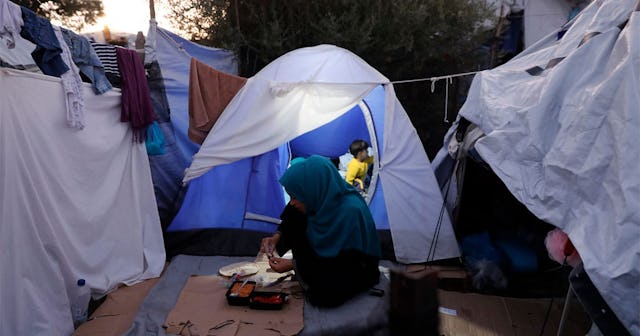Social Distancing In A Tent With No Running Water

As a mom of school age kids, the last few weeks have been beyond stressful. Not only do I have to figure out how to work from home, keep my kids engaged, fed, and away from their iPads, I also have to yell at them to wash their hands and worry about making sure none of us get sick. I’m sure you’ve struggled too… coming up with daily schedules yet telling yourself it’s not the end of the world if those schedules aren’t followed; desperately googling activity sheets and getting annoyed when the kids aren’t paying attention to their teachers on Zoom. Yes, me too.
But imagine if as a mom, you had no iPads, no schedules, no running water to nag your kids to wash their hands. Imagine that you had no access to health care to speak of, and no luxury of social distancing, living in a tent in a refugee camp. Millions of moms are precisely in this situation today, fearing what is coming their way.
As I have dealt with my own struggles and frustrations over the last weeks, I keep thinking of the moms I met last year in Za’atari Refugee Camp in Jordan, less than ten miles from the border with Syria. I got to visit the camp that is home to nearly 77,000 Syrian refugees, many of them kids, as part of my work for the humanitarian and anti-poverty organization, Oxfam America. I have been wondering how the mothers I met there are faring, worrying for them and their families.
Syrian refugee children play during a sand storm at the Zaatari refugee camp on November 13, 2017.
AFP Contributor
And it’s not just Za’atari. Millions of people around the world live in refugee camps, some with only one water tap that gets used by up to 250 people. Worse yet, many are forced to live in less than 40 square feet of living space per person, the size of your average American bathroom. Two crucial steps in preventing the spread of the coronavirus – frequent hand washing and social distancing – are virtually impossible.
Moria refugee camp on the Greek island of Lesbos was built for 3,000 people, but now hosts nearly 20,000. More than 160 people use the same dirty toilet, and over 500 people use just one shower. In some parts of the camp, 325 people share one single water tap, and there is no soap. 15 to 20 people are living in a single shipping container, or in tents or makeshift shelters.
Refugee children play on a swing at the Zaatari refugee camp, 80 kilometers (50 miles) north of the capital Amman, on April 9, 2019. KHALIL MAZRAAWI/Getty
As the death toll rises rapidly in the US, the richest country in the world, I fear it will be just the tip of the iceberg if and when the virus spreads to the world’s most vulnerable communities.
And it’s not just refugee camps. There are nearly three billion people living in such poverty, without enough clean water, jobs and access to basic health care, and millions already facing the strain of years of malnutrition, disease and conflict. For them, the coronavirus will be a lethal killer.
In Gaza, where there are at least 13 confirmed COVID-19 cases, there are fewer than 70 intensive care beds for a population of two million.
16-year-old girl cradles her newborn baby at the UNFPA-run maternity centre in Zaatari Syrian refugee camp. SOPA Images/Getty
In Yemen, only 50 percent of health centers are functioning, and those that are open face severe shortages of medicines, equipment and staff. Around 17 million people – more than half the population of the country – have no access to clean water.
The humanitarian system was already overstretched and underfunded before the coronavirus, and now it’s making things much worse, all while the world reels from the economic impacts.
Oxfam is gearing up its entire humanitarian aid delivery system to help the most marginalized and people living in poverty as they face the rising tide of infections ahead. Despite access restrictions, we are working around the clock with communities, local NGOs, women and refugee-led organizations in more than 50 countries to deliver much needed humanitarian assistance and curb the spread of the virus.
A young girl flies a kite in Za’atari refugee camp in Jordan. Adeline Guerra/Oxfam
In the Za’atari, we have already carried out awareness sessions on the pandemic and proper hand washing with more than 2,000 children. With Jordan now in complete lockdown and access to the camp limited, all agencies are focusing on hygiene awareness messages and campaigns using WhatsApp groups to promote health and hygiene.
In the Cox’s Bazaar area of Bangladesh, more than 855,000 Rohingya are living in close quarters in makeshift camps, Oxfam is rapidly scaling up preventive measures like soap distribution and hand washing stations at communal facilities to help 70,000 refugees.
But so much more is needed.
The coronavirus is a powerful reminder that no individual, community, or country can deal with this crisis alone. As we all take steps to protect our loved ones and families, we also need to look beyond ourselves and take decisive steps to reduce the risks and threats faced by others.
We cannot address this crisis for some and not others. It simply won’t work. We are more at risk as a nation and global community when we leave people behind. We must care for everyone.
This article was originally published on